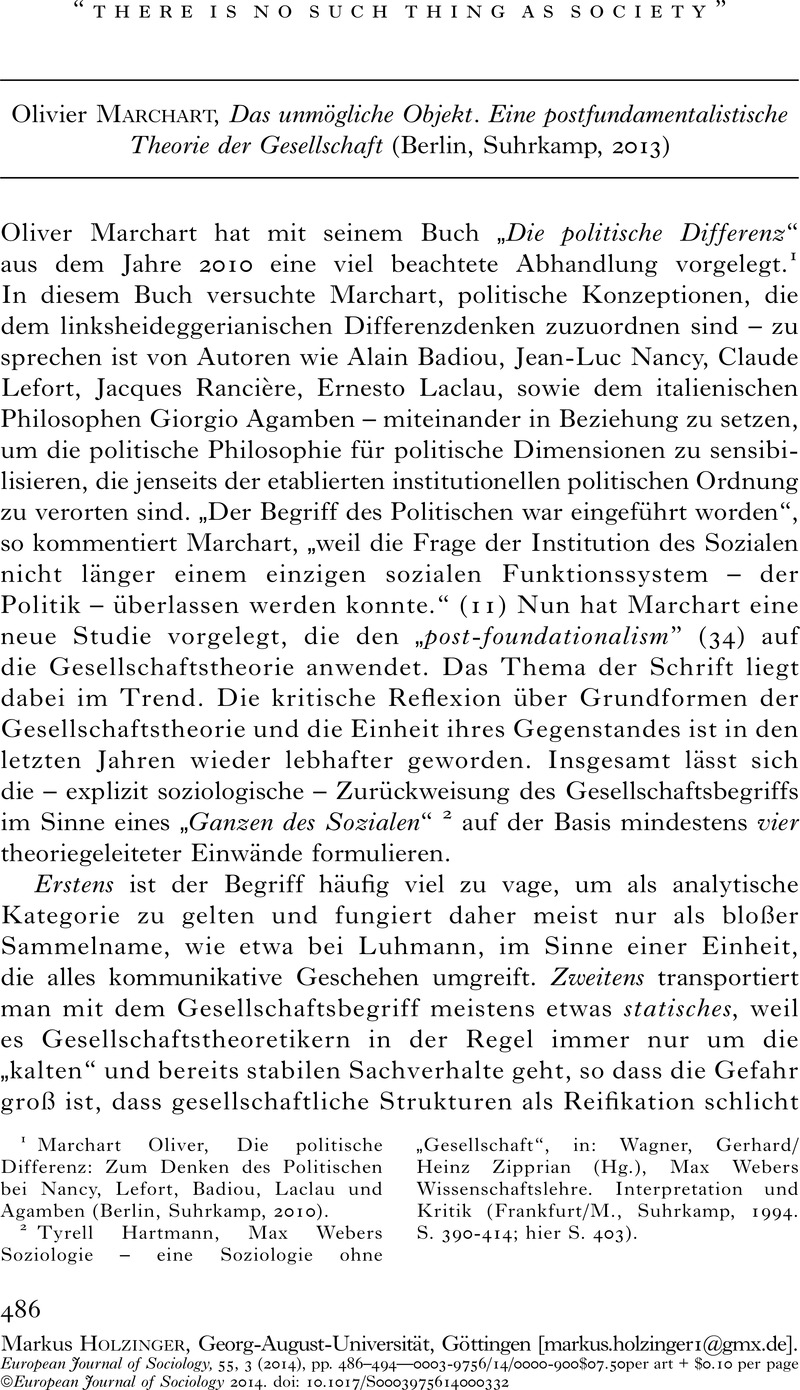Published online by Cambridge University Press: 16 January 2015

1 Marchart Oliver, Die politische Differenz: Zum Denken des Politischen bei Nancy, Lefort, Badiou, Laclau und Agamben (Berlin, Suhrkamp, 2010).
2 Tyrell Hartmann, Max Webers Soziologie – eine Soziologie ohne „Gesellschaft“, in: Wagner, Gerhard/Heinz Zipprian (Hg.), Max Webers Wissenschaftslehre. Interpretation und Kritik (Frankfurt/M., Suhrkamp, 1994. S. 390-414; hier S. 403).
3 Vgl. dazu: Schwinn, Thomas, Max Weber und die Systemtheorie: Studien zu einer handlungstheoretischen Makrosoziologie, (Tübingen, Mohr Siebeck, 2013, S. 141 f.).
4 Gabriel, Markus, Dissens und Gegenstand. Vom Außenwelt - zum Weltproblem, in: Skeptizismus und Metaphysik. Sonderband der Deutschen Zeitschrift für Philosophie, Nr. 28, (Berlin, Akademie Verlag, 2011, S. 73-92; hier S. 83).
5 Ebd., S. 84.
6 Weber, Max, Weber-Gesamtausgabe. Band I/6: Zur Sozial- und Wirtschaftsgeschichte des Altertums. Schriften und Reden 1893-1908 (Tübingen, Mohr Siebeck, 2006, S. 251).
7 Greven, Michael, Die politische Gesellschaft: Kontingenz und Dezision als Probleme des Regierens und der Demokratie (Opladen, Leske & Budrich, 1999).
8 Zu einer gegenteiligen Auffassung tendiert ebenso Schwinn, Thomas, Max Weber und die Systemtheorie: Studien zu einer handlungstheoretischen Makrosoziologie (Tübingen, Mohr Siebeck, 2013, S.138 ff.).
9 „Der Mensch ist nicht der Herr des Seienden. Der Mensch ist der Hirt des Seins.“ Vgl. Heidegger, Martin, Über den ›Humanismus‹, in: ders., Platons Lehre von der Wahrheit. Mit einem Brief über den ›Humanismus‹ (Bern, Francke, 2. Aufl., 1954, S. 53-119; hier S. 90).
10 Siehe dazu Welsch, Wolfgang, Homo mundanus. Jenseits der anthropischen Denkform der Moderne (Weilerswist, Velbrück, 2012, S. 310 ff.).
11 Manfred, Frank, Was ist Neostrukturalismus? (Frankfurt/M., Suhrkamp, 1984).
12 Mayntz, Renate, Zur Theoriefähigkeit makro-sozialer Analysen, in: Mayntz, Renate (Hg.), Akteure – Mechanismen – Modelle. Zur Theoriefähigkeit makro-sozialer Analysen (Frankfurt/New York, Campus Verlag, S. 7-44, hier S. 20).
13 Ebd.
14 Griffin, Larry J., Narrative, Event-Structure Analysis, and Causal Interpretation in Historical Sociology, in: American Journal of Sociology, 98, 5 (1993, S. 1094-1133); Joas, Hans, Die Kontingenz der Säkularisierung. Überlegungen zum Problem der Säkularisierung im Werk Reinhart Kosellecks, in: ders./Vogt, Peter (Hg.), Begriffene Geschichte Beiträge zum Werk Reinhart Kosellecks (Berlin 2011. S. 319-338); Knöbl, Wolfgang, Contingency and the Legitimacy of Sociological Criticism in World Society´, in: Kathya Araujo/Aldo Mascareño (Hg.), Legitimization in World Society (London, Ashgate, 2012, S. 177-195); Sewell, William H., Three Temporalities: Toward an Eventful Sociology, in: McDonald, Terrence (Hg.): The Historic Turn in the Human Sciences (Ann Arbor, University of Michigan Press 1996, S. 245-280); Steinmetz, George, American Sociology’s Epistemological Unconscious and the Transition to Post-Fordism: the case of Historical Sociology, in: Adams, Julia/Clemens, Elisabeth S./Orloff, Ann Shola (Hg.): Remaking Modernity (Durham/London, Duke University Press, 2005, S. 109-157).
15 Sewell, William H., Three Temporalities: Toward an Eventful Sociology, in: McDonald, Terrence (Hg.), The Historic Turn in the Human Sciences (Ann Arbor, University of Michigan Press 1996, S. 245-280; hier S. 272).